Disaster
TESTIMONIES FROM THE FLOODED OBRENOVAC
Encroachment at Unnatural Speed
Maybe the tragedy could not have been avoided, but the consequences certainly could have been less serious and without casualties. How could the Tamnava rush into the city unannounced and from the undefended side? What was the role of Rovni Dam above Valjevo when the water tide plunged in Obrenovac with startling speed and force? Why did the sirens go off only the following morning, when the city was already flooded? There are many difficult questions that must be answered by a fair and professional investigation. And there, in the tide, in horrifying days and nights, many known and unknown heroes were saving hat was left to be saved
By: Mišo Vujović
Photographs: Archives of the Serbian Army,
SAJ, Mišo Vujović, Nikola Obradović
 Almost without a sound, almost inaudibly, they were throwing out from their shops in the main street the destroyed stock of clothes, footwear, appliances, food... Fear, sorrow and uncertainty crept into the lives of these people.
Almost without a sound, almost inaudibly, they were throwing out from their shops in the main street the destroyed stock of clothes, footwear, appliances, food... Fear, sorrow and uncertainty crept into the lives of these people.
Even the hygienic masks that protected them from unpleasant odors and disease could not hide the pain and disbelief on their faces. But it is not easy to defend from the enraged whim of the nature, which the man, the ”most intelligent” being in the food chain, has greedily been trying to ”tame”. As if the nature, with its unpredictability and cruelty, tried to emulate the humans. Or to retaliate. People from Obrenovac felt this on their shoulders from May 15 this year. In only a few hours, the raging creek turned a wealthy town, the industrial center in the vicinity of Belgrade, into a big landfill. The swollen Kolubara, 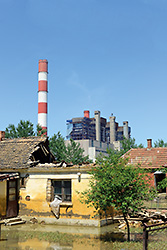 empowered with the small but impetuous Tamnava, left a wasteland behind, took dozens of human lives, while thousands of them were left without their property and roof over their heads. The material damage is difficult to estimate. In a short time, the water took away everything that generations of the people of Obrenovac and the surrounding areas had been building with their hands. A week later, Obrenovac resembled scenes from the film The Day after Tomorrow. The tide, with unbelievable force, carried everything in its way, knocked over cars, kiosks, demolished houses...
empowered with the small but impetuous Tamnava, left a wasteland behind, took dozens of human lives, while thousands of them were left without their property and roof over their heads. The material damage is difficult to estimate. In a short time, the water took away everything that generations of the people of Obrenovac and the surrounding areas had been building with their hands. A week later, Obrenovac resembled scenes from the film The Day after Tomorrow. The tide, with unbelievable force, carried everything in its way, knocked over cars, kiosks, demolished houses...
In the air, which is filled with unpleasant odor, there is a question: is it possible to restore life in this city?
It is not the first time that this tame town is facing the rage of water tide. Unfortunately, many people suppressed the memories of the great warning – the flood from 1981 – convinced that they are finally relieved and that construction of the embankment 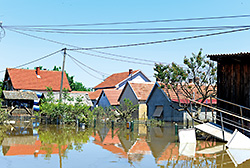 chased away that dragon forever. The settlements on which the modern Obrenovac was built had been flooded by the Sava River already in the late 18th century, when on the Srem side Empress Maria Therese built the first embankment, so the water would overflow on the right side. In 1930’s, the Sava was flooding farmland, which required construction of embankments. The first big embankment, 12 kilometers long, was built between 1937 and 1940. In the spring of 1962, Obrenovac was also hit by a big flood, when the Sava and Kolubara spilled, and the Yugoslav National Army then built an auxiliary embankment along Belopoljska Street. According to historians, until 1980’s in Serbia, on the Danube and Sava, embankments were built for defense from fifty years of water. However, the existing defense system in Obrenovac could not prevent the big flood in 1981.
chased away that dragon forever. The settlements on which the modern Obrenovac was built had been flooded by the Sava River already in the late 18th century, when on the Srem side Empress Maria Therese built the first embankment, so the water would overflow on the right side. In 1930’s, the Sava was flooding farmland, which required construction of embankments. The first big embankment, 12 kilometers long, was built between 1937 and 1940. In the spring of 1962, Obrenovac was also hit by a big flood, when the Sava and Kolubara spilled, and the Yugoslav National Army then built an auxiliary embankment along Belopoljska Street. According to historians, until 1980’s in Serbia, on the Danube and Sava, embankments were built for defense from fifty years of water. However, the existing defense system in Obrenovac could not prevent the big flood in 1981.
AND THEY KNEW HOW
 Života Stanojević, then the president of the municipality, who was, during this latest tragedy, trapped in his apartment in the centre of Obrenovac for two days, in his statement for National Review remembers how Obrenovac was defended at that time.
Života Stanojević, then the president of the municipality, who was, during this latest tragedy, trapped in his apartment in the centre of Obrenovac for two days, in his statement for National Review remembers how Obrenovac was defended at that time.
– We started to build so-called ”rabbit” embankments, but the water level was rising and there was not a chance to defend from it. Already in the afternoon, the Kolubara broke the embankment and water rushed toward Obrenovac. We immediately evacuated the settlement of Šljivice, relocated over a thousand families. We let the water flood the Vašarište and this part where the hotel is now, all the way to the Sava, about 800 hectares. It was the first cassette. Then we opened the second cassette, let the water flood Velika bara and to return in the flow of old Kupina, so that we would relieve th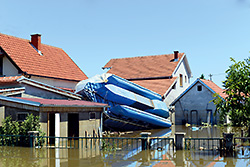 e pressure toward Obrenovac. At the same time we were building rabbit embankments so that the water would not get into the city. Experience of engineer Đorđević, the man who had been leading the defense of Obrenovac in 1962, had the decisive role. He told me that we must first contain Tamnava near the market, and then he specified several other points that we closed down. If this is not enough, he said, intercept the flow so the water would go to Velika bara. After that channel the water to Mladost, let it fill those cassettes, so that it would not overflow into the city. And this was done. But the city was overcome with panic, people started getting out into the streets. I ordered late Nestorović, director of the communal company, to wash the streets all night long. I had to convince the citizens somehow that we had everything under control and that there would be no problems. When the cisterns arrived, the comments began: ”So, what are you afraid of? Would they be washing the streets if they didn’t have things under control?” This gesture instilled confidence in people and they soon left the streets.
e pressure toward Obrenovac. At the same time we were building rabbit embankments so that the water would not get into the city. Experience of engineer Đorđević, the man who had been leading the defense of Obrenovac in 1962, had the decisive role. He told me that we must first contain Tamnava near the market, and then he specified several other points that we closed down. If this is not enough, he said, intercept the flow so the water would go to Velika bara. After that channel the water to Mladost, let it fill those cassettes, so that it would not overflow into the city. And this was done. But the city was overcome with panic, people started getting out into the streets. I ordered late Nestorović, director of the communal company, to wash the streets all night long. I had to convince the citizens somehow that we had everything under control and that there would be no problems. When the cisterns arrived, the comments began: ”So, what are you afraid of? Would they be washing the streets if they didn’t have things under control?” This gesture instilled confidence in people and they soon left the streets.
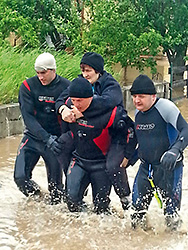 Života Stanojević, Žika Đora, forgotten hero of the defense of Obrenovac, is recounting the memories with ease, while we are sitting in front of his house in the village of Beljin, about twenty kilometers from Obrenovac.
Života Stanojević, Žika Đora, forgotten hero of the defense of Obrenovac, is recounting the memories with ease, while we are sitting in front of his house in the village of Beljin, about twenty kilometers from Obrenovac.
– There were also funny stories – Žika remembers. – In Belo Polje, when the water broke in, a local woman climbed on a poplar tree and didn’t want to enter the boat. Finally I came to convince her that she had to enter the boat and go to the shelter. But even I didn’t manage to persuade her. Then one of the rescuers turned away the boat and returned after a short while with a saw. He stopped right next to the tree and started swing. ”Stop!” she screamed in fear and came down into the boat n an instant.
Života Stanojević also recounted his experiences to the current president of Obrenovac, Čučković, in the eve of the latest disaster in this city. However, his younger colleague obviously did not have ear either for the impetuosity of Tamnava and Kolubara, or for advices of the wise strategist who, thirty years ago, was successfully wrestling against the enraged tantrums of the water tide. This situation again confirmed the wisdom of Bernard Show that ”Men are wise in proportion, not to their experience, but to their capacity for experience”.
THEY DID NOT LISTEN TO THE EXPERIENCED ONES
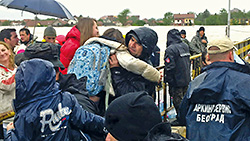 – They called me seven hours before the flood. I thought that they were getting ready. That they were aware of the imminent danger. Subconsciously I believed that the embankments would hold. They asked me to tell them concisely how Obrenovac was defended in 1981. I replied with a question, asking them to tell me what the current situation is like? Unfortunately, with no intention to accuse anybody, they didn’t know anything. I didn’t get answerless even to the following questions: What is your preparation in materials? How many people have you evacuated? Do you have prepared capacities? So, how do you plan to defend? The answer was: 1,400 sandbags will arrive from Makiš, we will recruit private companies. They had to do the same thing as in 1981: close the road to the cattle market and
– They called me seven hours before the flood. I thought that they were getting ready. That they were aware of the imminent danger. Subconsciously I believed that the embankments would hold. They asked me to tell them concisely how Obrenovac was defended in 1981. I replied with a question, asking them to tell me what the current situation is like? Unfortunately, with no intention to accuse anybody, they didn’t know anything. I didn’t get answerless even to the following questions: What is your preparation in materials? How many people have you evacuated? Do you have prepared capacities? So, how do you plan to defend? The answer was: 1,400 sandbags will arrive from Makiš, we will recruit private companies. They had to do the same thing as in 1981: close the road to the cattle market and  channel the Tamnava to go around Belo Polje, to protect the road into Obrenovac near the gas station and to divert it to the right, and at the same time to evacuate a part of Obrenovac, primarily Šljivice, and to let the water fill the cassettes around the city. To prepare the location, if water should fill those cassettes, to channel it into the following cassettes: Velika bara, Mladost... It is about 600 hectares... And so on. Therefore, the water was supposed to be diverted around the city and the city would have been saved. As this was not done, the water penetrated Obrenovac directly. And it was the river water that penetrated, with all its power. And, I repeat, if they had closed it at the cattle market, this would not have happened. They tried to do something, but there was very little time for such an
channel the Tamnava to go around Belo Polje, to protect the road into Obrenovac near the gas station and to divert it to the right, and at the same time to evacuate a part of Obrenovac, primarily Šljivice, and to let the water fill the cassettes around the city. To prepare the location, if water should fill those cassettes, to channel it into the following cassettes: Velika bara, Mladost... It is about 600 hectares... And so on. Therefore, the water was supposed to be diverted around the city and the city would have been saved. As this was not done, the water penetrated Obrenovac directly. And it was the river water that penetrated, with all its power. And, I repeat, if they had closed it at the cattle market, this would not have happened. They tried to do something, but there was very little time for such an 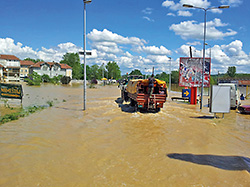 operation. There as no machinery or organization. In 1981, I didn’t wait for someone to offer help. I called Petar Gračanin, the state Ministry of the Interior, Executive Council, Stambolić, mayor of Belgrade Žika Kovačević, chief of Belgrade police Rajković, Water Management... I literally told them: ”I want you to be in the municipality in two minutes, if you think about saving Obrenovac!” And I did this before the embankment was broken, after I had received expert information that that it was going to be broken. Together with the municipal headquarters, the Crisis Headquarters was also established and it included, besides me, general Petar Gračanin, Olga Divac from the Hydro Institute in Belgrade, Aca Kolendžić, representatives of Water Management community from Belgrade, Ministry of the Interior... When he saw that I had the situation under control, general Gračanin said: ”
operation. There as no machinery or organization. In 1981, I didn’t wait for someone to offer help. I called Petar Gračanin, the state Ministry of the Interior, Executive Council, Stambolić, mayor of Belgrade Žika Kovačević, chief of Belgrade police Rajković, Water Management... I literally told them: ”I want you to be in the municipality in two minutes, if you think about saving Obrenovac!” And I did this before the embankment was broken, after I had received expert information that that it was going to be broken. Together with the municipal headquarters, the Crisis Headquarters was also established and it included, besides me, general Petar Gračanin, Olga Divac from the Hydro Institute in Belgrade, Aca Kolendžić, representatives of Water Management community from Belgrade, Ministry of the Interior... When he saw that I had the situation under control, general Gračanin said: ”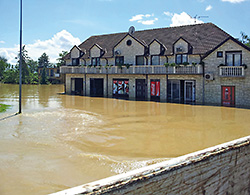 Žika is giving orders, we As I already said, I invited engineer Đorđević who had a prepared scheme of how to defend Obrenovac. And I mostly implemented that experience of his. Of course, we had all the companies, machinery and human resources. In two hours we literally closed the passage near the market. The Sava was threatening at the same time and in les than a day we had to build 150 meters of the Sava embankment. At five in the morning, Tomislav Erceg, who worked on the loader, seeing me so despondent, tired, sleep deprived, yelled: ”Come one, president, go home, get some sleep and rest! And come back here at one o’clock with a beer. Everything will be finished by then. It sounds unbelievable, but 150 meters of the Sava embankment was built between five in the morning and one in the afternoon. We had ninety t
Žika is giving orders, we As I already said, I invited engineer Đorđević who had a prepared scheme of how to defend Obrenovac. And I mostly implemented that experience of his. Of course, we had all the companies, machinery and human resources. In two hours we literally closed the passage near the market. The Sava was threatening at the same time and in les than a day we had to build 150 meters of the Sava embankment. At five in the morning, Tomislav Erceg, who worked on the loader, seeing me so despondent, tired, sleep deprived, yelled: ”Come one, president, go home, get some sleep and rest! And come back here at one o’clock with a beer. Everything will be finished by then. It sounds unbelievable, but 150 meters of the Sava embankment was built between five in the morning and one in the afternoon. We had ninety t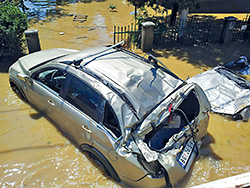 rucks and brought 900 cubic meters of soil at once. Everything was organized, the point of loading, loaders, there was no waiting, the police securing the road. Unfortunately, this does not exist today! This system has gone, and a new one has not been made. Every year there were drills and courses. Everybody knew what their role would be in emergency situation. The mobilization was also simple and efficient. In only a few hours we mobilized the necessary personnel. They would distribute sealed envelopes in which everything was specified. People, places, actions, technical equipment. Every envelope had a code. My head of the Secretariat for national defense called 24 presidents of local communities and distributed them the envelopes. There was no discussion, everything was defined in the envelopes. Therefore, there was the profession, organization and impeccable coordination. And it is not difficult to evaluate what has left of all of this.
rucks and brought 900 cubic meters of soil at once. Everything was organized, the point of loading, loaders, there was no waiting, the police securing the road. Unfortunately, this does not exist today! This system has gone, and a new one has not been made. Every year there were drills and courses. Everybody knew what their role would be in emergency situation. The mobilization was also simple and efficient. In only a few hours we mobilized the necessary personnel. They would distribute sealed envelopes in which everything was specified. People, places, actions, technical equipment. Every envelope had a code. My head of the Secretariat for national defense called 24 presidents of local communities and distributed them the envelopes. There was no discussion, everything was defined in the envelopes. Therefore, there was the profession, organization and impeccable coordination. And it is not difficult to evaluate what has left of all of this.
SPASIBA, MATUSHKA, SPASIBA
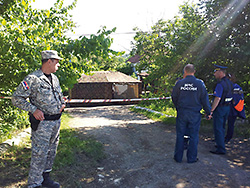 My guide, experienced veteran from many battlefields, would not accept that the devastating consequences could not have been mitigated.
My guide, experienced veteran from many battlefields, would not accept that the devastating consequences could not have been mitigated.
– It is obvious that certain instances failed. That the system did not function. That the competent authorities ignored the warnings of experts and meteorologists that a big storm is coming and carrying floods. This tragedy is certainly the consequence of many years of neglect in the area of water management, overlapping of responsibilities, systemic destruction of companies that were fighting against erosion of the soil, neglected and clogged channels built to receive and divert tidal water and, finally, inertia of the management for  who the alarm didn’t g off even after the flooding of Ub, from where the enraged Kolubara plunged toward Obrenovac. A day earlier, the village of Poljana and a part of the village of Draževac were flooded. Water was coming at unnatural speed up to half a meter in an hour. Such a quantity, with such force, is simply unnatural. People have been saying that Rovni dam above Valjevo broke, and some even claim that it was released, in order to save Valjevo. And this accumulated water, they say, plunged with full force toward Ub and Obrenovac. Then it was already certain that it was a huge water tide and that he people should be evacuated. On Thursday evening, Veliko Selo was flooded, and it was partially evacuated already that
who the alarm didn’t g off even after the flooding of Ub, from where the enraged Kolubara plunged toward Obrenovac. A day earlier, the village of Poljana and a part of the village of Draževac were flooded. Water was coming at unnatural speed up to half a meter in an hour. Such a quantity, with such force, is simply unnatural. People have been saying that Rovni dam above Valjevo broke, and some even claim that it was released, in order to save Valjevo. And this accumulated water, they say, plunged with full force toward Ub and Obrenovac. Then it was already certain that it was a huge water tide and that he people should be evacuated. On Thursday evening, Veliko Selo was flooded, and it was partially evacuated already that  evening. It is absurd that in those moments the Crisis Headquarters ”decided” that there was no need to panic and that Obrenovac is not endangered, and at ten o’clock floods started in Belo Polje, where already in the early morning hours on Friday, as well as in settlements of Topolica and Vašarište, water was more than half a meter deep. Only then the siren for danger went off. Already at nine o’clock entire Obrenovac was flooded, although the night before they were trying to convince us that the city would be defended – says this experienced and well informed man.
evening. It is absurd that in those moments the Crisis Headquarters ”decided” that there was no need to panic and that Obrenovac is not endangered, and at ten o’clock floods started in Belo Polje, where already in the early morning hours on Friday, as well as in settlements of Topolica and Vašarište, water was more than half a meter deep. Only then the siren for danger went off. Already at nine o’clock entire Obrenovac was flooded, although the night before they were trying to convince us that the city would be defended – says this experienced and well informed man.
The impotence of the Crisis Headquarters, according to my interlocutor, was also reflected during the 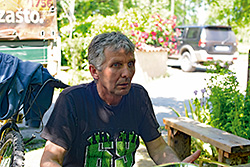 evacuation. It began in an organized manner only in the afternoon, when the Russian rescue units arrived, which had waited for almost three hours to get instructions from local authorities.
evacuation. It began in an organized manner only in the afternoon, when the Russian rescue units arrived, which had waited for almost three hours to get instructions from local authorities.
– However, as we all know, thanks to the skill and courage of Russian specialists, many lives were saved. They also rescued dozens of our rescuers whose boats were overturned by the tide. Those are aliens, supermen, people with incredible spirit, tireless, fearless, trained... They only asked for guides and nothing else. They were jumping into the raging tide, dove, swam, jumped from bridges, pulled boats, climbed on buildings. We could only hear: ”Give, give!...” Those people did not stop for a moment, they were fighting without sleep and rest, and certainly prevented even the greater disaster. They instilled confidence in all of us, gave us strength to survive. About  seventy Russian rescuers took out about 3,000 people. You can see for yourself what percentage of the total number of rescued people this is. And every citizen of Serbia, and especially Obrenovac, must say the name Russia with respect from now on. Спасибо,Россия, спасибо большое!
seventy Russian rescuers took out about 3,000 people. You can see for yourself what percentage of the total number of rescued people this is. And every citizen of Serbia, and especially Obrenovac, must say the name Russia with respect from now on. Спасибо,Россия, спасибо большое!
My interlocutor is telling all this with undisguised emotions and than stands up, crosses himself, staring at the sky. He adds that only Russian rescuers did not have little notes with ”priorities for evacuation”, but were rushing where it was the most dangerous, like a fleet, in military order, and were saving affected people on the way.
This stout man from Obrenovac doesn’t want us to forget the volunteers from Belgrade, Smederevo, Stara Pazova and other parts of Serbia, who came with their boats and equipment to rescue the victims.
THEY FAILED, OBVIOUSLY
The breeze carried the odor of rot and decay. Sanitary vehicles of Bulgarian, Romanian, Macedonian teams for remedying the situation were cruising around the city. On the embankment opposite from Hotel ”Obrenovac”, dozens Slovenian and Bulgarian pumps were pumping water. Croatian rescue teams also gave big contribution to rescuing the victims from Obrenovac. The citizens with masks on their faces quietly stood on the point of the ”Red Cross” for distribution of food and drink.
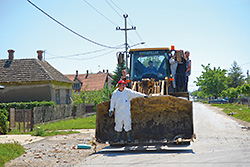 – Even the oldest citizens of Obrenovac could not have imagined that that Kolubara could enrage like this. Everybody wondered what really had happened and how come such a small rivulet, which had never threatened Obrenovac, could strike with such a force. The city was always being defended from the Sava, and not from Kolubara or Tamnava. There are stories that the embankment near Veliko Selo was broken on purpose, in order to save TENT, so the city was left undefended. Instead of into the Sava, Kolubara went into the city, devastating everything in its way. If this is true, somebody must be held responsible. The very fact that the Kolubara already on Wednesday broke the dam above Valjevo and that this water went toward us, and that the competent authorities did not take this seriously, that already on Thursday the water flooded or devastated suburban areas, and that the sirens went off only on Friday morning, around five o-clock, when the after was already flooding the very centre of the city, is clear indication that the entire system of defense failed completely – says Saša Branković, who managed to evacuate his family in the last moment, almost to himself.
– Even the oldest citizens of Obrenovac could not have imagined that that Kolubara could enrage like this. Everybody wondered what really had happened and how come such a small rivulet, which had never threatened Obrenovac, could strike with such a force. The city was always being defended from the Sava, and not from Kolubara or Tamnava. There are stories that the embankment near Veliko Selo was broken on purpose, in order to save TENT, so the city was left undefended. Instead of into the Sava, Kolubara went into the city, devastating everything in its way. If this is true, somebody must be held responsible. The very fact that the Kolubara already on Wednesday broke the dam above Valjevo and that this water went toward us, and that the competent authorities did not take this seriously, that already on Thursday the water flooded or devastated suburban areas, and that the sirens went off only on Friday morning, around five o-clock, when the after was already flooding the very centre of the city, is clear indication that the entire system of defense failed completely – says Saša Branković, who managed to evacuate his family in the last moment, almost to himself.
His neighbor Živorad Branković adds that the warning came when they were already flooded.
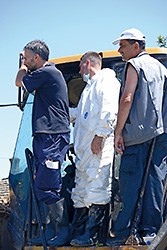 In front of the house of Milovan Ranković in Prote Mateje Street, a dead fish lying in the remaining puddle on the asphalt. Like most people from Obrenovac, he wasn’t able to rescue anything.
In front of the house of Milovan Ranković in Prote Mateje Street, a dead fish lying in the remaining puddle on the asphalt. Like most people from Obrenovac, he wasn’t able to rescue anything.
– I was alone in the house. Everything happened so fast, I only managed to run to the upper floor. People were saving their children in panic, we were cut-off from the world, both fixed and mobile phone lines were disconnected. We could hear cries for help, screams, older ground floor houses disappeared under water in a short time. It was cold, maybe around ten degrees. The water penetrated extremely fast. Entire families with children were trapped. The drama continued in evening hours as well, when rescuers arrived, who were making superhuman effort to first put the children into the boats. It was horrifying to watch the mothers letting their children go down into the boats from windows. For a few days I was watching fish swimming down the street and in the yard. I was trapped on the upper floor, and after two days they brought me some food on the boats. Where am I to go? My daughter lives in Vienna. But I hope that I am not alone and that the state will help us to remedy the consequences of this disaster – tells Milovan, pointing at his destroyed household and raised parquet on the ground floor.
Zoran Ranković from Urovci hardly managed to move away his eighty year old mother, wife and daughter, but his family jewelry was gone:
– A few days before the flood, a colleague of my wife stayed with us, since her house in Ub had been allegedly flooded. And while I was helping my eighty year old mother to get on the truck, she managed to take all family jewelry from the – Zoran sighs.
”A” TEAM FO RESCUERS
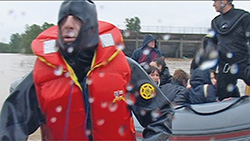 Special anti-terrorist unit of the Ministry of Interior of Serbia headed by commander Spasoje Vulević embarked on a rescue missions from Čačak and Ub to Obrenovac. The leader of A Team of SAJ, lieutenant colonel Vladan Mirković, says for National Review that the unit, although specialize for different types of operations, completed this task with its full capacity.
Special anti-terrorist unit of the Ministry of Interior of Serbia headed by commander Spasoje Vulević embarked on a rescue missions from Čačak and Ub to Obrenovac. The leader of A Team of SAJ, lieutenant colonel Vladan Mirković, says for National Review that the unit, although specialize for different types of operations, completed this task with its full capacity.
– The unit gave its maximum in every respect, from technical to human resources. We instantly recruited all available men, w even called the members of our unit who had been on a leave of absence or on vacations. We achieved high mobility and managed to respond to all requirements of the Crisis Headquarters. We transferred parts of the unit to the flooded areas and provided assistance to people, from evacuation by boats and helicopters to distribution of food, medications and administering first aid. Although we did not have experience in such rescue missions, our unit  completely performed the task – lieutenant colonel Mirković is convinced, and in the middle of conversation he receives an order to go with A Team to the demolished Krupanj.
completely performed the task – lieutenant colonel Mirković is convinced, and in the middle of conversation he receives an order to go with A Team to the demolished Krupanj.
My next interlocutor, diver Ivan Simonović, stands up, takes his equipment and goes to perform the new task.
– We will talk some other time – he says over his shoulder while running into a new uncertainty.
Dragan Miladinović, diving instructor in the Unit, admits that he was startled with the situation in the field, mostly with the quantity of water that had flooded several villages in the vicinity of Čačak.
– Unlike Kolubara, the Čemernica River spilled from its bed and was relatively cal, so we were not fighting against the water currents, but we were facing abundance of misinformation. This hidden enemy, which is difficult to restrain in situations like this, was spreading panic the most. Our arrival certainly stabilized the situation and encouraged the local people. In the morning hours of May 16, we went to Obrenovac, where the situation was really much more complex. The water force was enormous. A mountain river was literally raging through the city. It was a true feat in this tide to save people embarked on the boat. Our boats are not rescue boats, they don’t  have railing and they have landing function. They are intended for fast transfer of small landing groups. Local people were of great help to us since we didn’t know the city, so we could reach the addresses we were given from the headquarters very quickly. Of course, the priority was to evacuate women and children – this brave specialist remembers, emphasizing that the unity of all units and citizens was on a very high level.
have railing and they have landing function. They are intended for fast transfer of small landing groups. Local people were of great help to us since we didn’t know the city, so we could reach the addresses we were given from the headquarters very quickly. Of course, the priority was to evacuate women and children – this brave specialist remembers, emphasizing that the unity of all units and citizens was on a very high level.
– At times I had the impression that everything is pre-planned, although we did spontaneously. Simply, all the units were synchronized, in cooperation, without anybody running ahead, and this brought back confidence to the affected people. The looks of those rescued people after evacuation were glued to the city. Those looks full of sorrow and grief were saying more than a thousand words. It is interesting that the children were brave, most of them didn’t utter a sound, huddled in the boat they were clinging to their relatives or rescuers. I was mostly touched by that, as a human and as a parent, but it also stimulated me to persevere in the battle with the unknown and unpredictable challenge.
BEYOND HUMAN ABILITY
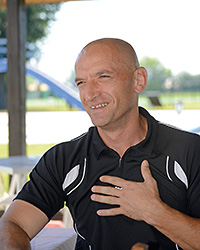 One of immediate commander of the rescue mission in Obrenovac was lieutenant colonel Dragan Barašin, deputy commander of SAJ.
One of immediate commander of the rescue mission in Obrenovac was lieutenant colonel Dragan Barašin, deputy commander of SAJ.
– Although our unit was trained for the most difficult tasks, the intensity and quantity of water were surprising even for us. The sight in Obrenovac was really horrifying, even for our people. The flood in Čačak was only a warm up in comparison with all the complexity of the situation in Obrenovac. We started the rescue mission with four teams who pulled out 380 people during the day. The next day, units of border police arrived with four more boats, Croatian special unit ATJ Lučko with two crews and two crews of civil rescue on water from Novi Sad. There were eleven boats in total under our command. We worked without stopping, we would transport as many as eighteen people in one boat. Sometimes it was not easy to explain to people who were waiting for evacuation that we had to evacuate the youngest ones first. Children are always the top priority but, of course, nobody was left without help. It happened that we  would not have communication with the teams for entire hour, which made the situation even more dramatic. Transmitters didn’t work, mobile network was disconnected, there was no electricity. In moments like this everything goes through the head of the man who is responsible both for the lives of people and for safety of his subordinates. In some parts of the town the water was very high, all the cars on the street were under the water – says lieutenant colonel Barašin, with undisguised emotion, for who this mission will remain inscribed in his mind and heart forever. Primarily because of the children they were rescuing and who were giving them strength, as he said, to go beyond what was humanly possible.
would not have communication with the teams for entire hour, which made the situation even more dramatic. Transmitters didn’t work, mobile network was disconnected, there was no electricity. In moments like this everything goes through the head of the man who is responsible both for the lives of people and for safety of his subordinates. In some parts of the town the water was very high, all the cars on the street were under the water – says lieutenant colonel Barašin, with undisguised emotion, for who this mission will remain inscribed in his mind and heart forever. Primarily because of the children they were rescuing and who were giving them strength, as he said, to go beyond what was humanly possible.
Exactly because of these small nameless heroes, the drama of Obrenovac and trauma they will carry inside for the rest of their lives, it is necessary to move some other boundaries. Boundaries of responsibility, knowledge, humaneness, virtue...
I am not convinced that it was only the rage of the nature that caused the cyclone that was standing above Serbia for days, tearing up the hills that were swallowing entire settlements, flooding cities and farmland, railroads and roads, schools and kindergartens, spreading fear, panic and hopelessness. Maybe some other ”unholy” powers were at play here, those created in the incessant attempts of men to conquer the Creator. What is encouraging and what gives hope for the life of Serbia is that we, and especially young people, for a moment went out of our egoistic shells, steppe out of collective vanity and opened our hearts.
***
Heroes
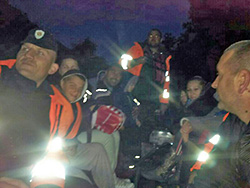 Nikola Obradović from Obrenovac was continuously on the boat with one of the Russian teams:
Nikola Obradović from Obrenovac was continuously on the boat with one of the Russian teams:
– This is my city, I was born here, my children were born here. At the moment nobody thinks about consequences, and especially when you see trapped children, old people, disable and ill people. This cry of the helpless gave superhuman strength to the rescuers. One of the brightest examples of self-sacrifice and love was a case of an elderly couple. The old man was able to save himself, but he didn’t’ want to leave his immobile wife. He went after her into the eternal empire of love. A special stimulus for us to persevere in the struggle against unpredictable and enraged river was coming from the Russians. They were above everybody and are the greatest heroes in this tragedy.
***
Duty
Among numerous brave rescuers, policeman Goran Lepojević also excelled with his self-sacrifice. According to estimates of the witnesses, he saved several hundred people, mostly women and children, during the biggest tide of the water, from the most affected parts of the city. Just like most rescuers, he doesn’t see it as a feat but as duty:
– It is my professional duty to help people in various situations, especially in trouble. This flood was a big challenge and a big unknown for all of us, but the important thing is that we all did our best. Fortunately, we managed to save most of the victims. The rest should be evaluated by those in charge.
***
Too Late and Too Slow
– Had we been warned in time, maybe something could have been salvaged. My house is relatively new, on the first floor we had enough space to put what was the most valuable, but the most tragic and the most painful is the fact that we had a feeling of being left alone. Our drama began in the night between Thursday and Friday, and the first rescuers came to Obrenovac on Saturday, when the public found out that the city had been flooded. At that moment most people were trapped in their apartments. Unfortunately, there was no help for many of them and the question is what we will find in Veliko Polje, Belo Polje, Šljivica – says one of the shop owners, who was trapped together with his family in the city centre for two days.
***
Negligence and Carelessness
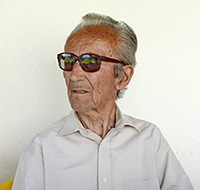 – After the flood from 1981, we reconstructed the entire defense system. The investment then amounted to 270 billion dinars. Seventy four kilometers of new embankments were reconstructed and built, 320 kilometers of sewerage network, 84 culverts, bridges, nine new pump stations. This meant completion of defense from ”a hundred years of waters” and the system was handed out to the Water Management for maintenance. Today these are ”Beogradvode” and ”Srbijavode”. Unfortunately, the system was poorly maintained and was not secured at all. To years ago, I said in a TV show: if water should hit like in 1981, god help you. There are channels that have not been cleaned in 15-20 years, which reduced their capacity and throughput. How many neglected culverts are there!? I now that two pump stations were completely looted. Everything was taken. They have remained probably in a poor condition. Embankments must be maintained regularly, a single mole can make a disaster. Let’s remember the example of that Dutchman who noticed that the water was leaking through the embankment through a hole the size of a finger. He plugged the hole with his finger and cried for hp, but nobody heard him. Exhausted, he died there, with his finger in the hole, but the water did not flood that part of the Netherlands. He was later declared a national hero. This is not only an example of sacrifice but high civil awareness and responsibility. It is also necessary to control traffic on the embankments. On most embankments the rams are broken, nobody has maintained them. The rule is that every year preparations should take place for regular defense form the floods, regardless of the forecasts of the meteorologists. Once a year we used to have military inspection that controlled our readiness, plans, resources and everything else. They would stay in the municipality for fifteen days and tested all of us like little pupils, to see whether we were ready for a natural disaster – remembers the former president of Obrenovac, Života Stanojević, convinced that the city could have been defended. But, he emphasizes, without good and professional analysis we should not accuse anybody in advance, because there are many questions that must be answered primarily by the experts, so that we would later make conclusions and order adequate measures.
– After the flood from 1981, we reconstructed the entire defense system. The investment then amounted to 270 billion dinars. Seventy four kilometers of new embankments were reconstructed and built, 320 kilometers of sewerage network, 84 culverts, bridges, nine new pump stations. This meant completion of defense from ”a hundred years of waters” and the system was handed out to the Water Management for maintenance. Today these are ”Beogradvode” and ”Srbijavode”. Unfortunately, the system was poorly maintained and was not secured at all. To years ago, I said in a TV show: if water should hit like in 1981, god help you. There are channels that have not been cleaned in 15-20 years, which reduced their capacity and throughput. How many neglected culverts are there!? I now that two pump stations were completely looted. Everything was taken. They have remained probably in a poor condition. Embankments must be maintained regularly, a single mole can make a disaster. Let’s remember the example of that Dutchman who noticed that the water was leaking through the embankment through a hole the size of a finger. He plugged the hole with his finger and cried for hp, but nobody heard him. Exhausted, he died there, with his finger in the hole, but the water did not flood that part of the Netherlands. He was later declared a national hero. This is not only an example of sacrifice but high civil awareness and responsibility. It is also necessary to control traffic on the embankments. On most embankments the rams are broken, nobody has maintained them. The rule is that every year preparations should take place for regular defense form the floods, regardless of the forecasts of the meteorologists. Once a year we used to have military inspection that controlled our readiness, plans, resources and everything else. They would stay in the municipality for fifteen days and tested all of us like little pupils, to see whether we were ready for a natural disaster – remembers the former president of Obrenovac, Života Stanojević, convinced that the city could have been defended. But, he emphasizes, without good and professional analysis we should not accuse anybody in advance, because there are many questions that must be answered primarily by the experts, so that we would later make conclusions and order adequate measures.
